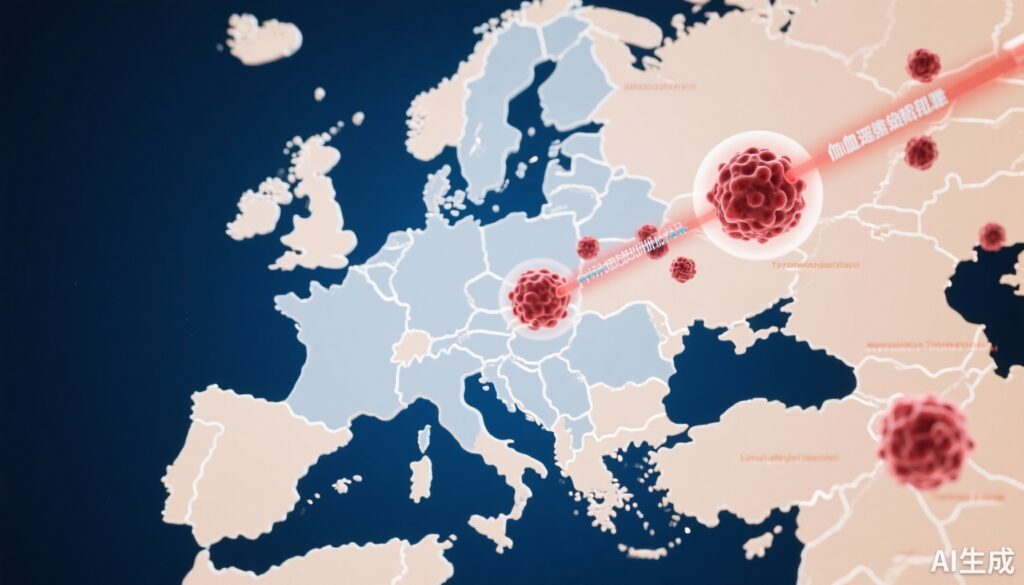Highlight
Lenvatinib plus pembrolizumab achieved a 5-month progression-free survival rate of 88.4% in pretreated metastatic B3 thymoma and thymic carcinoma, surpassing historical controls. Treatment demonstrated a manageable safety profile, with hypothyroidism and fatigue the most frequent adverse events. Immune-related toxicities, although observed in some patients, were generally controllable, and no treatment-related deaths occurred.
Study Background and Disease Burden
Thymic epithelial tumors (TETs), including B3 thymomas and thymic carcinomas, are rare malignancies of the anterior mediastinum characterized by variable histopathological features and clinical behavior. Advanced stage disease often exhibits aggressive progression and poor prognosis. Platinum-based chemotherapy remains the mainstay first-line treatment; however, options are limited for patients refractory or relapsed after platinum regimens. No globally accepted standard second-line therapy exists for these patients, highlighting a significant unmet clinical need.
Type B3 thymoma and thymic carcinoma, particularly in metastatic stages, demonstrate resistance to conventional therapies and a propensity for rapid disease progression. Immune checkpoint inhibitors have shown some activity in thymic carcinoma but are associated with substantial autoimmune toxicities in this patient group. Conversely, lenvatinib, a multi-targeted tyrosine kinase inhibitor, has demonstrated antitumour activity in various solid tumors, including thymic carcinoma, by targeting angiogenesis and tumor proliferation pathways. Combining lenvatinib with pembrolizumab, an anti-PD-1 immune checkpoint inhibitor, aims to synergize targeted inhibition with immune activation.
Study Design
The PECATI trial is a single-arm, phase 2 study conducted across 11 hospitals in France, Italy, and Spain, designed to evaluate the efficacy and safety of combined lenvatinib and pembrolizumab in patients with pretreated metastatic B3 thymoma and thymic carcinoma.
Eligible participants were adults aged 18 years or older, with Eastern Cooperative Oncology Group (ECOG) performance status 0-1, histologically confirmed B3 thymoma or thymic carcinoma, and metastatic disease that relapsed or progressed despite at least one prior platinum-based chemotherapy line. Patients with autoimmune disorders were excluded to minimize potential immune-related adverse events.
Treatment involved oral lenvatinib at 20 mg daily combined with intravenous pembrolizumab 200 mg administered every 3 weeks. Treatment continued up to 35 cycles (approximately 2 years) unless disease progression or unacceptable toxicity necessitated discontinuation.
The primary endpoint was 5-month progression-free survival (PFS), measured from treatment initiation to documented disease progression or death. The null hypothesis assumed a 5-month PFS rate of 50% or less, while the alternative hypothesis targeted a PFS rate of at least 68.6%, based on historical controls of platinum-refractory TETs. Safety and tolerability were assessed in all participants who received at least one treatment dose.
Key Findings
Between May 2022 and February 2024, 43 participants (median age 57 years, 42% female) commenced treatment: 36 (84%) had thymic carcinoma and 7 (16%) had B3 thymoma. Disease severity was advanced, with 65% stage IVB and 53% having three or more metastatic sites, including liver metastases in 37%.
After a median follow-up of 10.6 months, the study met its primary endpoint, with a robust 5-month PFS rate of 88.4% (90% confidence interval [CI], 79.8%-96.7%), significantly exceeding the predefined alternative hypothesis target. This suggests substantial antitumour activity in this heavily pretreated population. The high PFS rate is especially notable given the limited efficacy of existing therapies for platinum-refractory thymic malignancies.
Regarding safety, treatment-emergent adverse events (TEAEs) were nearly universal (98%), with hypothyroidism (63%) and fatigue (58%) most common. Grade 3 or higher treatment-related adverse events occurred in 37% of patients. Serious adverse events were reported in 40%, with immune-related toxicities (e.g., hepatic cytolysis, colitis, pneumonitis, myocarditis, encephalitis) occurring in 14% and necessitating prompt management. Importantly, there were no treatment-related deaths, indicating an acceptable safety profile with diligent monitoring.
Expert Commentary
The PECATI trial provides compelling evidence supporting the combination of lenvatinib and pembrolizumab as an effective salvage regimen for advanced B3 thymoma and thymic carcinoma refractory to platinum chemotherapy. The 5-month PFS of 88.4% contrasts favorably with prior studies of monotherapy immunotherapy or targeted agents in this rare tumor setting.
Biologically, lenvatinib’s inhibition of VEGFR and other receptor tyrosine kinases may potentiate PD-1 blockade by modulating the tumor microenvironment, enhancing immune infiltration and response. This synergistic effect likely underpins the clinical benefits observed.
However, clinicians should remain vigilant for immune-related adverse events, as these can be severe though manageable with established protocols. The exclusion of patients with autoimmune disorders helps limit risk.
Limitations include the single-arm design and modest sample size, inherent to rare tumor studies, underscoring the need for larger randomized trials to confirm efficacy and further characterize safety. Additionally, the heterogeneity of B3 thymoma and thymic carcinoma subtypes may influence treatment response and warrants investigation.
Conclusion
The PECATI phase 2 trial marks a significant advance in the management of platinum-refractory metastatic B3 thymoma and thymic carcinoma. Combination therapy with lenvatinib and pembrolizumab demonstrated high progression-free survival at 5 months and a manageable safety profile, offering a potential new standard of care for this difficult-to-treat population.
Close monitoring for toxicity remains essential due to the frequency of immune-related adverse events. Future studies should prioritize randomized designs, explore biomarkers predictive of response, and optimize patient selection to maximize therapeutic benefits.
This study reinforces the paradigm of combining targeted agents with immunotherapies in rare, aggressive cancers, opening new therapeutic avenues in thymic malignancies.
References
Remon J, Bironzo P, Girard N, Bigay-Game L, Juan-Vidal O, de Castro J, Reguart N, et al. Lenvatinib plus pembrolizumab in pretreated metastatic B3 thymoma and thymic carcinoma (PECATI): a single-arm, phase 2 trial. Lancet Oncol. 2025 Sep;26(9):1215-1226. doi:10.1016/S1470-2045(25)00300-6. PMID: 40907517.
Girard N. Thymic epithelial tumors: from biology to treatment. Chin Clin Oncol. 2019;8(S1):S28. doi:10.21037/cco.2018.09.04.
Giaccone G, Kim C, Thompson J. Novel therapies for thymic malignancies: The immune checkpoint era. J Thorac Oncol. 2020;15(9):1373-1383.
Cho J, Ku BM, Kim SJ, Lee JS. Immune checkpoint blockade in thymic epithelial tumors. Lung Cancer. 2020;147:8-17.
Kaira K, Horinouchi H, Chikamatsu K, et al. Safety and efficacy of lenvatinib in advanced thymic carcinoma: an observational study. BMC Cancer. 2021;21(1):365.
Paz-Ares L, Stinchcombe TE, Garon EB, et al. Safety and efficacy of pembrolizumab in patients with thymic carcinoma. J Clin Oncol. 2016;34(14_suppl):8514.
Kim AW. Management of thymic malignancies. J Thorac Dis. 2018;10(Suppl 22):S2642-S2651.



